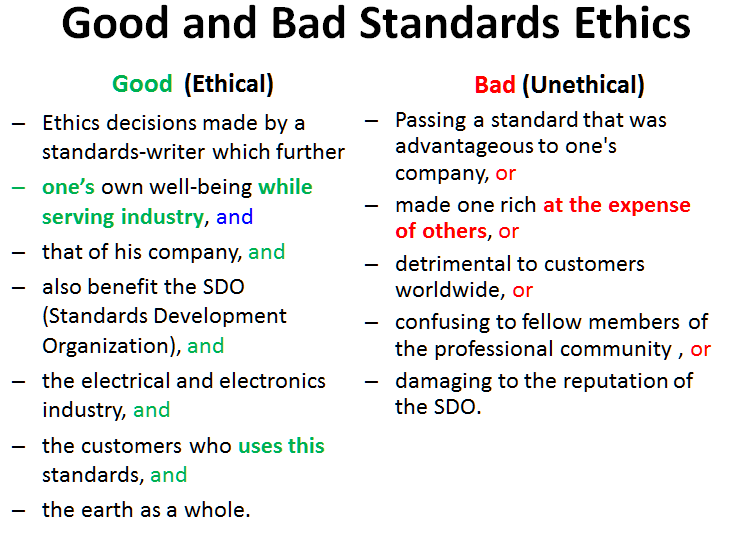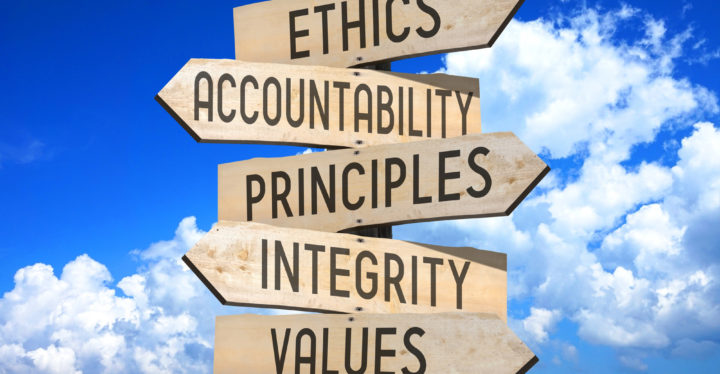When we think of standards development or use, we tend to picture a group of hardworking individuals huddled around a table or in an on-line meeting, coming up with the best ever, all-inclusive standard.
Oh, if only it were that simple! Experience has shown that this ideal process frequently does not occur. Rather, the following actions by a standards development individual, company, or industry segment are examples of ethical abuses of the standards development process or application.
If we look at the overarching ethical concepts of standards development, we can categorize standards ethics as ”good” or “bad”. The following table lists good and bad standards ethics, and offers a guideline relative to what behavior constitutes either good or bad standards ethics during the standard development process.
Good standards ethics shall meet all of the listed seven good criteria, or conversely, fail any one of the five bad criteria.

Some Examples of Standards Abuse
“Packing” the working group or voting pool
I have witnessed standards development meetings in which the operating procedures were incomplete, and because they were incomplete, allowed a company or industry to pack the meeting with colleagues who were not really involved in the development of the standard in question, but attended the meeting for the sole purpose of group voting. What was even more disturbing was the practice of the hiring of “shills” to attend the meeting, who were instructed to watch the way a particular individual voted and always vote the same way.
Falsifying self-certification data
Examples of unethical actions include selection non-representative test samples in order to provide test data for the marketing organization to use in their collateral; or even worse, creating specially made units to use in the self-certification test program.
Submitting “special” non-representative products for standards review
I have seen abuses of creation of special products to be used for standards review. For example, specially made samples that were needed in order to meet a customer’s requirements, or two specially made sets of samples made by an engineer – one for safety tests and one for performance tests.
Placing SDO logo on products that have not been submitted for test and review
A major example of standards abuse by an engineer was submitting self-certification of data to a safety organization with the thought that he was too busy to do the testing, but would do the testing later.
“Emissionsgate”
One of the most publicized ethics issues in recent years was the infamous “Emissionsgate,” in which a major global automotive manufacturer’s engineers programmed engines to activate certain emissions controls only during laboratory emissions testing. This was done with the simple goal of providing better performance on the road. This programming was deployed in about eleven million cars worldwide and resulted in billions of dollars in fines and recalls of these cars.
What Can We Learn From These Examples?
Very simply stated—we should know what is ethical and what is unethical, and have a sense of what is right and what is wrong. Ultimately, we need to practice what is ethical in spite of any pressures to meet deadlines or meet safety, performance, or operational requirements.
Howard Wolfman • Lumispec Consulting, Adjunct Professor University of Illinois at Chicago, h.wolfman@ieee.org
Howard Wolfman received his BSEE from the University of Illinois, MBA from Northwestern University, and is a Registered Professional Engineer in Illinois. After many years of industry experience leading engineering, manufacturing, marketing, and sales functions in diverse product areas, he is now the principal of Lumispec Consulting, specializing in Management and Lighting Energy Efficiency.
Howard has held numerous leadership positions in domestic and international standards and trade organizations including ANSI, IEC, IEEE, NEMA, UL and CSA. He has been a member of the IEEE Standards Board for what seems to be forever – about 12 of the last 15 years.
His IEEE activities include past chairman of the Chicago Chapter of the EMC Society, past member of the Board of Governors of the EMC, IAS, and EMS Societies, past chairman of the Chicago Section, past region 4 Director and past IEEE Treasurer.
He is an adjunct full professor in the Master of Engineering Program at the University of Illinois at Chicago, has been a lecturer at universities worldwide, made numerous presentations, and authored many papers. He is a recipient of the IEEE Centennial Medal (1984), the IEEE Third Millennium Medal (2000) and the NEMA Kite and Key Award (2008).




